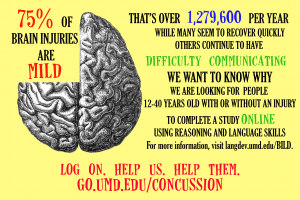Blog - Looking for study participants
Looking for study participants
Based on our previous work in young children and adults, we’ve seen evidence that not only can people with a recent concussion have difficulty finding the right word, but also they can struggle with skills like grammar and auditory processing of language. These difficulties appear to be present even when controlling for general cognitive differences and have clear implications for patients as they return to their academic and professional lives. Unique to this study, I am able to examine not only the written product itself but also glimpse the process of writing with millisecond precision (as such, we can look at variables like revisions, errors, or efficiency in typed writing, which has never been done before).
We are looking for anyone 12-40 years old who is a native speaker of English.
We are collecting data from a few sub-groups:
12-40-year-olds within 30 days of their first concussion
12-40-year-olds within 30 days of an orthopedic injury (orthopedic control group)
12-40-year-olds with no history of concussion
12-40-year-olds with a history of concussion, repeated concussion, or repeated subconcussive blow exposure
With the exception of the chronic group, this design including orthopedic controls has become fairly common now for capturing and controlling for cognitive issues related to trauma and stress. The cognitive-emotion connection is a secondary, but important, aspect of this study. To me, having this dimension is very important to capture the complete picture of what patients are truly experiencing after an injury. I have attached a digital advertisement.
Thank you for your time and consideration.
Hannah
No Description
